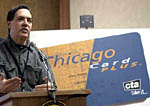CTA taking the next step to have plastic
pay way
By Jon Hilkevitch
Tribune transportation writer
Date of Publication: January 16, 2004
Source: Chicago
Tribune

Chicago Transit Authority
President Frank Kruesi unveils the Chicago Card Plus new
fare card, that will led riders automatically reload a new
fare card with their personal credit cards. For a larger
view, click here.
(Tribune photo. Copyright © 2004, Chicago
Tribune)
|
With a new CTA "smart" card debuting next week that allows riders to
add money through their credit cards, the Chicago Transit Authority
is moving a step closer to a fare system where cash is rarely
used.
Experts said the move knocks down another barrier to creation of a
universal transportation card that would help unify Chicago-area mass
transit. Such a card would also be used to pay for Amtrak and airline
tickets, taxi and limousine rides and tolls on the Illinois tollway
system.
The Chicago Card Plus, which is costing the CTA about $1 million
to roll out, is designed to lower internal costs--potentially helping
postpone the next fare increase--and speed bus and rail service by
boarding passengers more quickly.
The Plus card will work as either a 30-day unlimited ride pass,
which sells for $75, or a pay-per-use pass on CTA buses and trains
and Pace buses.
Cash fares will still be accepted, but the CTA is offering
incentives for riders to use the new card. Cash makes up only 16
percent of all fares, and the agency would ultimately like to bring
that figure down to 1 percent.
A reduced-fare Plus card won't be available until later this year
to senior citizens, students and disabled riders, officials said.
They can continue to use their reduced-fare passes and still receive
a 10 percent bonus for prebuying multiple rides, officials said.
Sign-up for the cards starts at 9 a.m. Monday. CTA officials said
it would take several days to process the requests and mail the
cards.
The existing Chicago Card smart card and the new Plus card, which
will be available free through March 31, will cost $5 starting April
1.
Pay-per-use patrons can authorize credit-card payments in $10,
$20, $40 or $60 increments and check account balances on-line,
similar to the tollway's I-PASS toll-collection system.
Charges are made automatically on the credit card when account
balances fall below $10. Users would receive a $1 bonus for every $10
of added value, officials said.
Companies and employees enrolled in the RTA/CTA Transit Benefit
program will be able to sign up next week for the Plus card and
receive the cards starting April 1. The CTA will mail the Plus card
to employees in the Transit Benefit program, which is a
payroll-deduction program that shields up to $100 in income monthly
from taxes.
Like the current Chicago Card smart card, the Chicago Card Plus
will contain a tiny computer chip that enables riders to pay fares by
touching the card--or a wallet holding the card--against an
electronic reader on bus fare boxes or turnstile devices at rail
stations.
Value will still be added to Chicago Cards at CTA vending
machines. The Chicago Card Plus will be reloaded strictly by
credit-card accounts.
Either way, CTA president Frank Kruesi said the fare-collection
process takes .3 second with the smart cards, versus 2 seconds
inserting and withdrawing a regular magnetic strip transit card into
a slot and considerably longer to count and deposit the correct cash
fare.
Increased use of the smart cards, which currently account for only
1 percent of fare transactions, is expected to be a particular
time-saver on heavily used bus routes,where buses get bunched in one
area, leaving passengers on the route waiting long periods.
"I've been in plenty of lines at rush hour, where you will see 15,
20 people or more waiting to get on a bus," Kruesi said.
Kruesi said there are no immediate plans to eliminate the Chicago
Card or the CTA magnetic transit card. But after March 31, the CTA
will no longer pay magnetic-card customers a 10 percent bonus for
buying at least $10 in fares.
A key goal of the smart technology is to get cash fares, which are
the most expensive to process and are vulnerable to internal theft,
down to about 1 percent of all fares paid, officials said.
The technology in the Chicago and Chicago Plus cards makes it
possible to program equipment to deduct the correct $1.50 base fare
on Pace, the $1.75 base fare on CTA and the distance-based fare on
Metra.
"Eight to 10 years from now, there will probably be a
single-payment medium in our wallets, along with some cash, to pay
for all this stuff," said David Schulz, executive director of the
Infrastructure Technology Institute at Northwestern University. "It
won't be like a bar code tattooed to our foreheads, but we will use
it to ride transit buses and trains, Amtrak, limousines and United
Airlines, if they are still in business."
Copyright © 2004, Chicago Tribune
